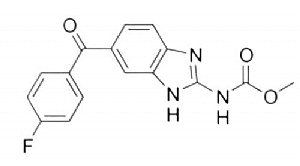Description: Flubendazole. Flubendazole is a fluorine analog of mebendazole and the two drugs have similar spectra of activity.

Mechanism of action: Benzimidazoles are specific inhibitor of microtubule assembly, acting by binding to the heterodimeric subunit, the tubulin molecule. The preferential binding of the benzimidazoles for parasite tubulin is some 100-400 fold greater than that to host tubulin; this fact is an important key to their safe use anthelminthic agents.
Indications: broad-spectrum nematicide and taenicide anthelmintic.
Dosage: 30 mg/kg feed × 7 days in poultry; 60 mg/kg feed × 7–14 days in partridges, pheasants.
Pharmacokinetics: Flubendazole is almost insoluble in water. Orally administered flubendazole is poorly absorbed into the bloodstream. This means that significant amounts remain in the gastrointestinal tract and are available for the control of gut-dwelling roundworms and tapeworms.
Metabolism:
Toxicity: Oral LD50, rat, acute: >5000 mg/kg
Residues: In layers, flubendazole leaves very low residues in eggs, which allows low or nil withholding periods for eggs. Data from Kan et al., (1998) Analyst, 123:2525–2527


Description: Fenbendazole
Indications: Treatment and control of nematode parasites
Dosage:
Pharmacokinetics:
Metabolism:
Toxicity: Decrease semen quality in Turkey breeder toms.
Residues:





